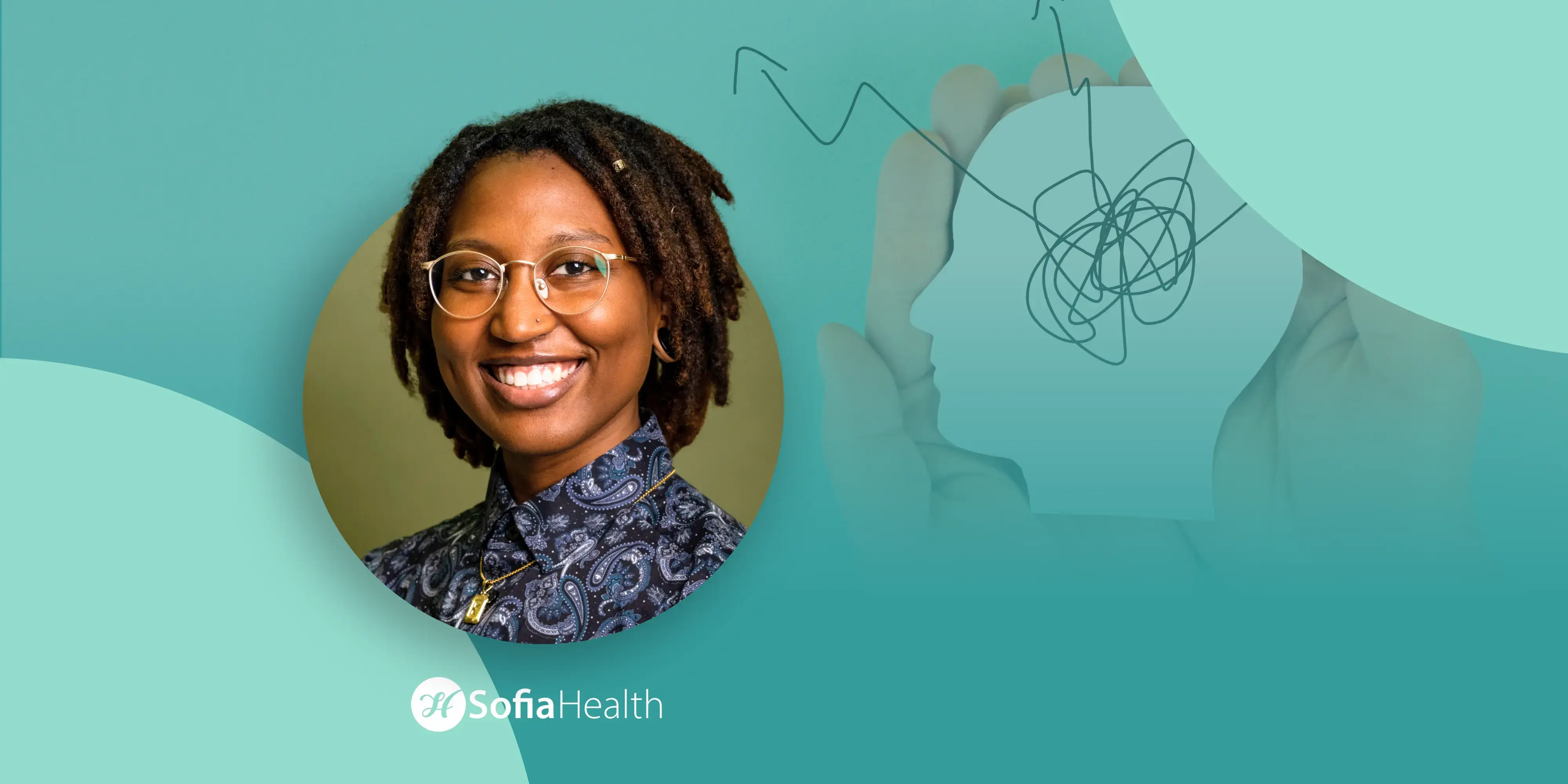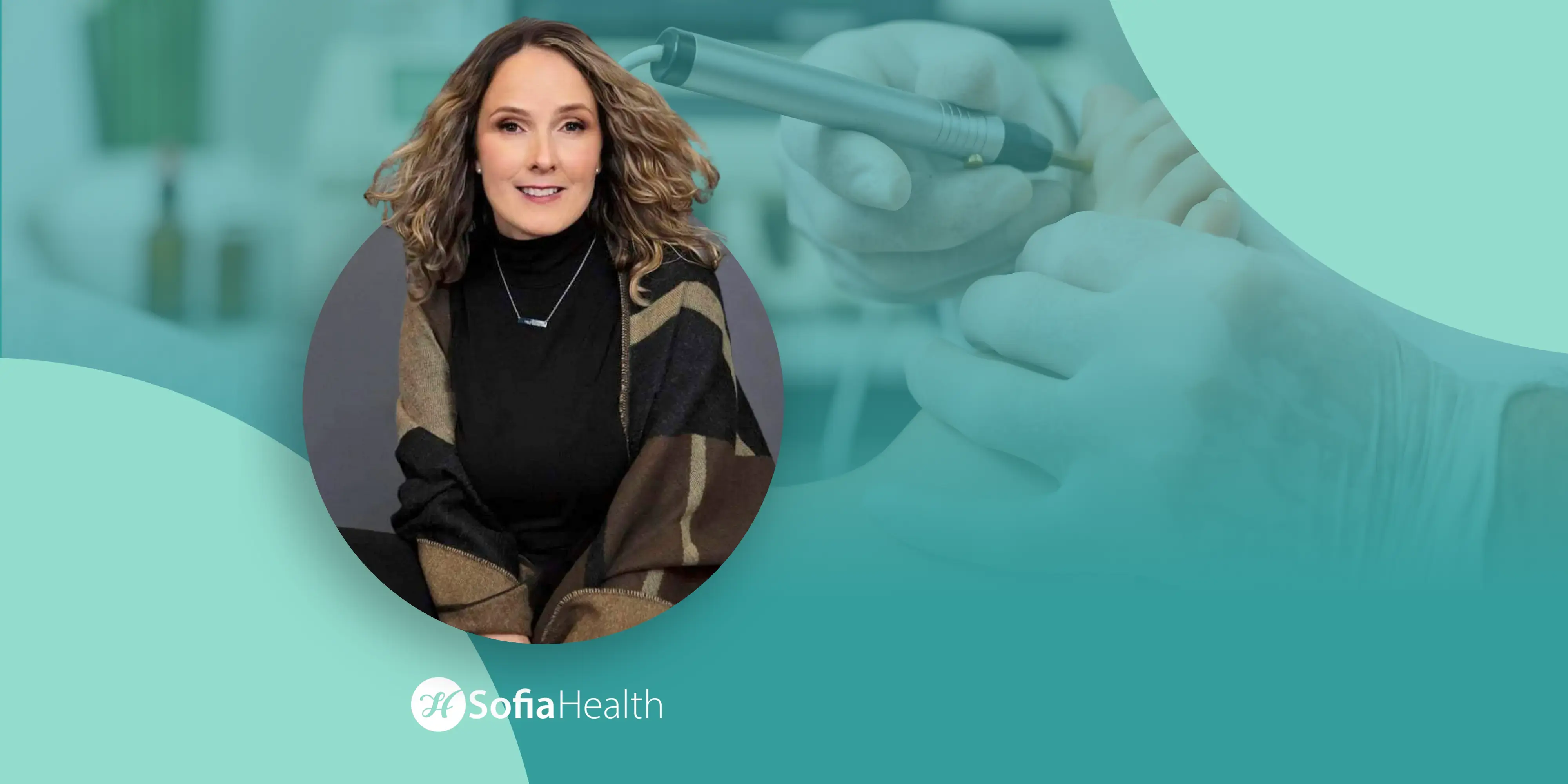Meet Kris Williams, a Licensed Professional Counselor with an MA in Counseling and Art Therapy from Ursuline College. Specializing in Brainspotting, Kris empowers diverse clients to integrate mind, body, and spirit, helping them overcome challenges and reach their full potential. Join us as she shares her expertise in this interview with Sofia Health.
What is Brainspotting and how does it work?
Brainspotting is a powerful and gentle way to help people heal from emotional pain and trauma. It works by using a person's natural eye position and gaze to find specific spots in the brain where trauma and distress are stored. During a session, we work together to identify these 'Brainspots' by noticing how your body and eyes respond when looking in various directions.
This process helps us tap into the deep, unprocessed areas of the brain where your past experiences are held. By focusing on these spots, Brainspotting allows you to release and process these emotions, leading to profound physical, emotional, and psychological healing. It's like giving your brain the space to heal, helping you feel more balanced and whole.
What led you to pursue training in Brainspotting, and how has it enhanced your counseling practice?
I was drawn to Brainspotting because I wanted a therapeutic approach beyond traditional talk therapy, enabling clients to access deeper forms of healing. Many of my clients were dealing with symptoms and emotions deeply rooted in their nervous systems, and I knew I needed a method to address these challenges more effectively. Brainspotting stood out because it works well with diverse populations and offers deep spiritual grounding for clients from non-traditional backgrounds. I love how Brainspotting empowers clients by tapping into their ability to heal both mind and body. It’s a truly transformative tool that has enriched my counseling practice and allowed me to support my clients on a much deeper level.
Sofia Health connects you to traditional, integrative, nutritional, holistic, and spiritual healing professionals to help you personalize your healing journey.
What specific techniques are used in Brainspotting, and what advantages do they offer to patients?
How does your use of Brainspotting intersect with your dedication to serving the BIPOC and LGBTQ+ communities, and what inspired you to focus on these populations in your counseling practice?
Members of these populations face numerous adversities and often carry unspoken generational trauma that can be difficult to understand or articulate. Brainspotting is a powerful tool for accessing and healing these deep-seated wounds because it doesn't rely solely on verbal communication or conscious awareness of thoughts, feelings, and behaviors. Instead, it engages the body and nervous system, enabling a more profound and holistic healing process.
My dedication to serving BIPOC and LGBTQ+ communities stems from both witnessing and experiencing the unique challenges faced by these groups. These communities often encounter systemic oppression, discrimination, and a lack of representation in traditional therapeutic settings. My goal has been to create a safe, inclusive space where individuals can feel seen, heard, and validated.
What inspired me to focus on these populations is recognizing the significant need for providers who not only serve these communities but also understand and relate to their experiences. I wanted to offer healing modalities that truly resonate with their unique challenges. Brainspotting's flexibility and depth make it an ideal approach for addressing the complex layers of trauma that BIPOC and LGBTQ+ individuals may carry. By integrating Brainspotting into my practice, I aim to help my clients reclaim their narratives and foster resilience, empowerment, and healing.
In what ways does Brainspotting complement other therapeutic approaches in supporting the mental health and well-being of individuals from these communities?
Brainspotting complements other therapeutic approaches like ACT, solution-focused therapy, and CBT in several impactful ways, especially for individuals from BIPOC and LGBTQ+ communities. These approaches are all about helping clients develop skills to manage their thoughts, emotions, and behaviors, and Brainspotting adds an extra layer by directly addressing the nervous system. It helps to reinforce the skills we discuss by providing a way to calm and regulate the body’s responses to stress and trauma.
One of the key benefits of Brainspotting is that it increases client's understanding of themselves, their triggers, and the underlying relationships between their thoughts, feelings, behaviors, and experiences. This self-awareness is crucial for marginalized individuals, who often face unique and compounded mental health struggles. Brainspotting also empowers clients by allowing them to heal without needing to relive traumatic events or repeatedly tell their stories, which can be re-traumatizing.
By integrating Brainspotting with ACT, solution-focused therapy, and CBT, we create a comprehensive approach that promotes self-acceptance and compassion. This is particularly important for those in marginalized communities, who may experience heightened feelings of isolation, guilt, and low self-worth. Brainspotting helps to foster a deeper sense of self-compassion and understanding, enabling clients to move forward with greater resilience and empowerment.
Besides Brainspotting, you also work with other evidence-based approaches including ACT, SFBT, and Art Therapy. How do you determine which is most suitable for individual clients?
When determining which therapeutic approach to use with individual clients, I start with Acceptance and Commitment Therapy (ACT) as my foundation. ACT is incredibly versatile and can be applied both in and out of the therapeutic space, making it a valuable tool for helping clients navigate life in general. Most clients can relate to ACT principles and concepts, which significantly improve their well-being.
From there, I complement ACT with Cognitive Behavioral Therapy (CBT) and Solution-Focused Brief Therapy (SFBT). CBT helps clients understand and change their thought patterns, while SFBT is great for addressing immediate issues and boosting motivation. By focusing on how to make immediate changes and taking action toward longer-term goals, SFBT is particularly helpful for clients with complex needs and histories.
In addition to these approaches, I integrate art interventions to help clients better visualize, grasp, and internalize these concepts. Engaging clients creatively allows them to see different perspectives, find enjoyment in the therapeutic space, challenge themselves with something new, and re-evaluate how they relate to themselves and the world around them. Many clients are surprised to see their inner workings reflected on paper, which helps them understand just how impactful their inner experiences are.
Ultimately, I tailor the approach to each client’s unique situation. I blend the most relevant aspects of CBT and SFBT with ACT and art interventions to create a holistic and effective treatment plan. This personalized approach ensures that we address both immediate challenges and deeper, more complex issues, providing comprehensive support for each client’s journey toward healing and growth.
What are your most helpful tips for optimal health?
Optimal health is a holistic journey, and I believe it starts with some foundational practices that support overall wellness. The majority of the work I do with clients centers on some main themes. First, having good grounding practices is essential. Whether it's through mindfulness, meditation, or spending time in nature, grounding helps you stay connected to the present moment and manage stress more effectively.
Spirituality also plays a crucial role in maintaining mental and emotional health. This doesn't necessarily mean religious practices; it can be anything that gives you a sense of purpose and connection, such as community involvement, personal rituals, or exploring your inner self. Movement is another key component. Engaging in physical activity, whether it's dancing, walking, or any other form of movement you enjoy, can greatly enhance your mood and energy levels. Movement helps transmute blocked energy and provides a different way to heal and process this energy through our bodies. It's about finding what feels good for your body and incorporating it into your routine.
Establishing a good routine is vital as well. Consistent daily practices, like regular sleep patterns, healthy eating habits, and time management, can help create stability and structure, which are important for overall well-being. One crucial component of this is creating a life that supports your individual needs. This means setting up systems and environments that help you succeed in what you need and want to do. Whether it's organizing your workspace, setting reminders, or developing a self-care plan, these systems can make a significant difference in how you manage your daily life and long-term goals.
The last essential aspect is cultivating a positive, affirming, and loving relationship with yourself. Be your own best friend, motivator, and cheerleader. The relationship we have with ourselves—what we believe we can do, how we treat ourselves, and how we speak to ourselves—impacts a large part of how we go through life. Developing self-compassion and a supportive inner dialogue can transform your overall outlook and resilience.
By focusing on grounding, spirituality, movement, routine, supportive systems, and self-compassion, you can create a balanced and fulfilling life that promotes optimal health and well-being.
More from Sofia Health
Explore more enlightening interviews with specialists at Sofia Health. Gain diverse insights, practical tips, and transformative advice on health and wellness topics. Whether it's nutrition, mental well-being, or holistic healing, these expert interviews provide valuable resources for your journey to holistic health. Please read on and help yourself with knowledge for a healthier life.
Whether you prefer a subscription over live classes or want to shop for individual services, classes, or products, we have you covered. We're here to help you meet your wellness goals for physical, mental, emotional, and spiritual health. You can also take advantage of the services offered by one of the providers at the Sofia Marketplace.
Better yet, make a daily dose of wellness part of your routine. Sofia Prime offers both live classes and an extensive on-demand video library. Choose from high-quality offerings in wellness, nutrition, fitness, and meditation.
Start your two-week trial today and discover the difference that dedication and expert help can make.
Disclaimer: The Sofia Unfiltered Blog by Sofia Health is for general informational and entertainment purposes only and does not constitute the practice of medicine, nursing, or other professional healthcare services, including the giving of medical advice. No doctor/patient relationship is formed. The use of information in this article or materials linked from this article is at the user’s own risk. The content of this article is not intended to be a substitute for professional medical advice, diagnosis, or treatment. Users should not disregard or delay in obtaining medical advice for any medical condition they may have. For any health concerns, users should seek the assistance of their healthcare professionals.






